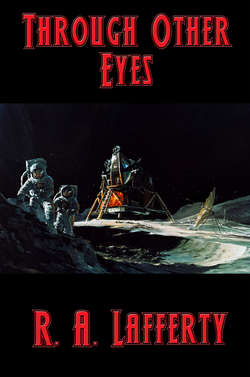Читать книгу Through Other Eyes - R. A. Lafferty - Страница 5
На сайте Литреса книга снята с продажи.
Through Other Eyes
ОглавлениеI
“I don’t think I can stand the dawn of another Great Day,” said Smirnov. “It always seems a muggy morning, a rainy afternoon and a dismal evening. You remember the Recapitulation Correlator?”
“Known popularly as the Tune Machine. But, Gregory, that was and is a success. All three of them are in constant use, and they will construct at least one more a decade. They are invaluable.”
“Yes. It was a dismal success. It has turned my whole life gray. You remember our trial run, the recapitulation of the Battle of Hastings?”
“It was a depressing three years we spent there. But how were we to know it was such a small affair—covering less than five acres of that damnable field and lasting less than twenty minutes? And how were we to know that an error of four years had been made in history even as recent as that? Yes, we scanned many depressing days and many muddy fields in that area before we recreated it.”
“And our qualified success at catching the wit of Voltaire at first hand?”
“Gad! That cackle! There can never be anything new in nausea to one who has sickened of that. What a perverted old woman he was!”
“And Nell Guinn?”
“There is no accounting for the taste of a king. What a completely tasteless morsel!”
“And the crowning of Charlemagne?”
“The king of chilblains. If you wanted a fire, you carried it with you in a basket. That was the coldest Christmas I ever knew. But the mead seemed to warm them; and we were the only ones present who could not touch it or taste it.”
“And when we went further back and heard the wonderful words of the divine poetess Sappho.”
“Yes, she had just decided that she would have her favorite cat spayed. We listened to her for three days and she talked of nothing else. How fortunate the world is that so few of her words have survived.”
“And watching the great Pythagoras at work.”
“And the long days he spent on that little surveying problem. How one longed to hand him a slide rule through the barrier and explain its workings.”
“And our eavesdropping on the great lovers Tristram and Isolde.”
“And him spending a whole afternoon trying to tune that cursed harp with a penny whistle. And she could talk of nothing but the bear grease she used on her hair, and how it was nothing like the bear grease back home. But she was a cute little lard barrel, quite the cutest we found for several centuries in either direction. One wouldn’t be able to get one’s arms all the way around her; but I can understand how, to one of that era and region, it would be fun trying.”
“Ah yes. Smelled like a cinnamon cookie, didn’t she? And you recall Lancelot?”
“Always had a bad back that wouldn’t let him ride. And that trick elbow and the old groin wound. He spent more time on the rubbing table than any athlete I ever heard of. If I had a high-priced quarterback who was never ready to play, I’d sure find a way of breaking his contract. No use keeping him on the squad just to read his ten-year-old press clippings. Any farm boy could have pulled him off his nag and stomped him into the dirt.”
“I wasn’t too happy about Aristotle the day we caught him. That barbarous north-coast Greek of his! Three hours he had them all busy combing his beard. And his discourse on the Beard in Essential and the Beard in Existential, did you follow that?”
“No, to tell the truth I didn’t. I guess it was pretty profound.”
They were silent and sad for a while, as are men who have lost much.
“The machine was a success,” said Smirnov at last, “and yet the high excitement of it died dismally for us.”
“The excitement is in the discovery of the machine,” said Cogsworth. “It is never in what the machine discovers.”
“And this new one of yours,” said Smirnov, “I hardly want to see you put it into operation. I am sure it will be a shattering disappointment to you.”
“I am sure of it also. And yet it is greater than the other. I am as excited as a boy.”
“You were a boy before, but you will never be again. I should think it would have aged you enough, and I cannot see what fascination this new one will have for you. At least the other recaptured the past. This will permit you to see only the present.”
“Yes, but through other eyes.”
“One pair of eyes is enough. I do not see any advantage at all except the novelty. I am afraid that this will be only a gadget.”
“No. Believe me, Smirnov, it will be more than that. It may not even be the same world when viewed through different eyes. I believe that what we regard as one may actually be several billion different universes, each made only for the eyes of the one who sees it.”
II
The Cerebral Scanner, newly completed by Charles Cogsworth, was not an intricate machine. It was a small but ingenious amplifying device, or battery of amplifiers, designed for the synchronous—perhaps “sympathetic” would be a better word—coupling of two very intricate machines: two human brains. It was an amplifier only. A subliminal coupling, or the possibility of it, was already assumed by the inventor. Less than a score of key aspects needed emphasizing for the whole thing to come to life.
